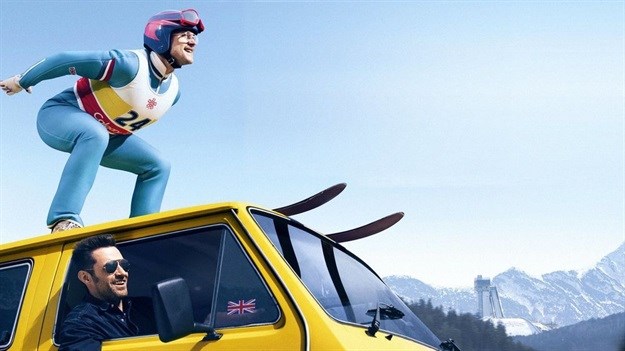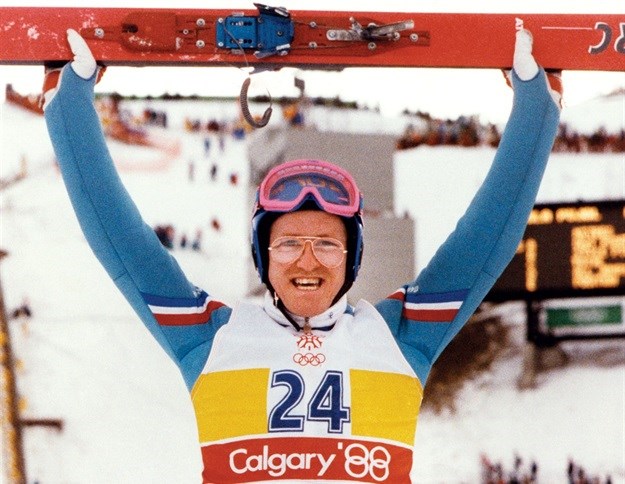
Top stories






LifestyleWhen to stop Googling and call the vet: Expert advice on pet allergies from dotsure.co.za
dotsure.co.za 16 Feb 2026
More news


Marketing & Media
Ads are coming to AI. Does that really have to be such a bad thing?














It's a highly entertaining story that takes us into the life of Eddie Edwards (Taron Egerton), an unlikely but courageous British ski-jumper who never stopped believing in himself and, with the help of a rebellious and charismatic coach (Hugh Jackman), took on the establishment and won the hearts of sports fans around the world by making an improbable and historic showing at the 1988 Calgary Winter Olympics.
It was directed by Dexter Fletcher (Wild Bill), from a screenplay by Sean Macaulay and Simon Kelton.
The journey from real life to big screen began one night in 2014, when Matthew Vaughn - director of Kingsman: The Secret Service, X-Men: First Class and Layer Cake - sat down to watch a film with his children. The film was Cool Runnings, the comedy about a Jamaican bobsled team that defied all the odds to compete in the 1988 Winter Olympics in Calgary.
“My kids were loving the film,” says Vaughn, “and I started thinking why does nobody make movies like this anymore? I wanted to make a movie that you could watch and just come out feeling inspired. And I wanted to do a film I could show my kids!”
Perhaps spurred on by the remarkable coincidence that the Jamaican bobsledders and Eddie Edwards competed at the same Olympics, Vaughn turned his thoughts towards The Eagle.
Fifteen years or so earlier, Vaughn and his then directing partner, Guy Ritchie, had been sent an Eddie The Eagle screenplay with a view to turning it into a movie. That deal hadn’t worked out, but something about it resonated with him. “I thought it was charming, and worth making. Loads of people had bought it since, but nothing had happened,” Vaughn explains. “I tracked down the script, said I wanted to buy it, and three months later we were filming.”
Vaughn quickly assembled his dream team both in front of and behind the camera. Deciding immediately that he didn’t want to direct (“This is a whole new experience for me, making a family-friendly feel-good film!”), he turned to his old friend Dexter Fletcher. Fletcher had starred in the first movie produced by Vaughn, Lock, Stock And Two Smoking Barrels, and the two had remained in touch ever since, during which both had become directors. Fletcher’s helming debut, Wild Bill, in particular, caught Vaughn’s eye.
“I loved Wild Bill,” says Vaughn. “Dexter’s good at heart, and he’s good at looking after people.”
Unlike Vaughn, who was glued to Eddie’s exploits in Calgary, Fletcher has little memory of the time.
“I was in my 20s, he wasn’t cool, and everything had to be cool when you were in your 20s,” laughs Fletcher. But he had been impressed when Edwards showed up in, and won, the British high-diving reality show, Splash!, “I thought, Eddie has the right attitude. He was 45 years old, but he had an Olympic approach to it, a real singlemindedness. He had no fear.”
So, when he got the call from Vaughn, Fletcher was more than ready to make the Eagle soar. “It was a great opportunity to work with Matthew as a producer, but there’s something really interesting about this story. It’s not just what we think we know,” he explains. “And then Matthew started talking to me like I was doing it. The train had left the station. I just happened to be on it!”
Fletcher and Vaughn wanted to keep the focus firmly on Eddie’s drive for glory. “The story is all about when he’s there and what he achieves,” says Fletcher.
Edwards’ exploits were solitary. Largely shunned by the ski jumping community, he would either train himself or go through a string of short-lived coaches. For the film, however, Vaughn and Fletcher wanted to create a character to join Eddie through every step of his journey. “We needed someone we can relate to, a participant we can imagine ourselves to be,” says Fletcher. “Our attitude towards Eddie would be that he’s mad, but we’re won over by his inspirational enthusiasm and approach.”
Enter Bronson Peary, a hard-drinking, chain-smoking American and former ski jumper who takes Eddie, very reluctantly at first, under his wing. It was a role created for a movie star. And one of the benefits of being as successful as Matthew Vaughn is that you have movie stars on speed dial. Hugh Jackman, for one.
“I rang Hugh up and sent him the script,” says Vaughn. “He remembered Eddie The Eagle. He told me he used to jump off the roof of his house in Australia and pretend it was a ski jump! Hugh loved the idea of doing this. He’s never done anything like this before.”
Jackman says he was indeed a huge Eddie The Eagle fan growing up -- just another reminder of the huge impact Eddie’s exploits had on the world at large. “Eddie was a legend who embodies that pure spirit of having a go. And he had a go at the most crazy - almost suicidal - event in sport: the ski jump. I mean, I wanted to be in the Olympics as a kid; I just wasn’t going to go this far!”

Jackman was also drawn in by the chance to play Peary, a fictional character, who is a damaged, cynical soul who was kicked out of the US Winter Olympics team at the peak of his powers. His friendship with Eddie enables a long-overdue healing process for Peary. “Eddie’s dogged determination intrigues Bronson,” adds Jackman. “He likes this kid. He thinks he’s flat-out crazy, but he relates to him. They’re both outsiders, they’ve both been shunned by the world, and it’s a redemption tale for both of them. Through that growing friendship, Bronson starts to believe in himself again.”
A key part of Peary’s arc is his relationship with his former coach, Warren Sharp, who kicked Bronson out of the US team all those years ago. Sharp remains a huge presence in Peary’s life, particularly in a climactic scene where the two meet for the first time in decades. But the character presented Vaughn and Fletcher with a casting challenge. “It had to be someone on a par with Hugh Jackman,” says Fletcher. “That’s Christopher Walken. When he came on set, it was just brilliant. What he does is so ‘Walken,’ but it’s powerful and moving, and means that Hugh’s character is more three dimensional as well.”
Jackman loved working with the legendary actor. “Honestly, no acting required!” he laughs. “For one scene, the script says ‘the godfather of the sport walks into the room and everyone goes still’. That’s pretty much what happened. It’s Christopher Walken! And he’s the coolest, most relaxed guy from take one until the end of the shoot. It’s all gold.”
Vaughn and Fletcher had their Bronson Peary. And they had their Warren Sharp. Now they just needed the biggest piece of the puzzle: The Eagle himself.
As it happens, the hunt for Eddie didn’t take very long, because Vaughn realised he had the perfect candidate right under his nose. He had just put the finishing touches on Kingsman: The Secret Service, starring Colin Firth, Samuel L Jackson, Michael Caine, Mark Strong, and as the film’s hero Eggsy, Taron Egerton, a young Welsh newcomer in his first film role.
“I knew Eggsy was a performance,” says Vaughn. “Eggsy is so not Taron. I said to him: ‘It’s important you do a character now that surprises people.’ I didn’t have a doubt that Taron was going to pull Eddie off.”
Egerton wasn’t even born when Edwards was soaring through the Calgary air, but the young actor quickly jumped at the chance. A test with Jackman in New York swiftly followed, before Egerton was officially offered the role just before Christmas 2014. But he took it on one proviso. “I have absolutely no interest in sending Eddie up,” says Egerton. “He can be funny, he can have mishaps, but he needs heart and soul and to be real and believable.”
His initial fears were misplaced. “I wanted to dial up the emotion,” says Vaughn. “That’s what I’m most excited with this movie. Audiences will no longer think of Eddie the clown, but as Eddie the hero.”
To prepare for the role, Egerton did meet the real-life Eddie, which helped inform his performance. “Eddie is a very reasonable and pleasant, affable chap,” he says. “He has optimism, and he’s focussed. There are things about Eddie that are heroic.”
The film was devised by Fletcher and Vaughn as a testament to the unshakeable faith that Edwards possessed. “He’s a hero,” says Vaughn. “Eddie literally risked his life with every jump. He was being bloody brave. The word ‘no’ is not in my vocabulary, and it wasn’t in his, either. That’s for sure. I admired Eddie.”
The film ends with a famous quote from Baron Pierre de Coubertin, the founder of the modern Olympics. ‘The most important thing in the Olympic Games is not winning but taking part; the essential thing in life is not conquering, but fighting well’. It sums up why Vaughn and Fletcher wanted to tell this story, and why they wanted to celebrate the fighting spirit of an unlikely hero. Eddie The Eagle Edwards may not have won an Olympic medal, but his example is an inspirational one. Says Vaughn: “This film shows that no matter how big a problem you may have - you can solve it. Having heart and determination and tenacity does work.”
Read more about this film and other new releases at www.writingstudio.co.za.
